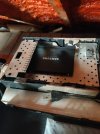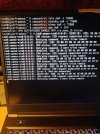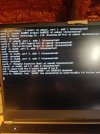Hello,
I'm using a laptop with a single M2 ssd disk with FreeBSD installed (auto-zfs).
Soon I will send my laptop to warranty and I'm thinking do a installation on a external USB HDD drive and import my home so I can connect to other laptop without toutching its internal disk.
Today I've boot FreeBSD in a USB pen and choosed "Auto-ZFS" but it points to my internal SSD.
Is there a way to work around this or clone internal disk to external one?
Other think, in the future I will use external disk as archive and backup using regular snapshots.
Thanks,
Nuno Teixeira
I'm using a laptop with a single M2 ssd disk with FreeBSD installed (auto-zfs).
Soon I will send my laptop to warranty and I'm thinking do a installation on a external USB HDD drive and import my home so I can connect to other laptop without toutching its internal disk.
Today I've boot FreeBSD in a USB pen and choosed "Auto-ZFS" but it points to my internal SSD.
Is there a way to work around this or clone internal disk to external one?
Other think, in the future I will use external disk as archive and backup using regular snapshots.
Thanks,
Nuno Teixeira







